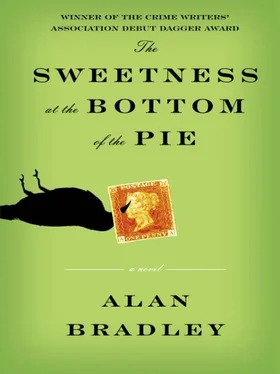Alan Bradley - The Sweetness at the Bottom of the Pie
Здесь есть возможность читать онлайн «Alan Bradley - The Sweetness at the Bottom of the Pie» весь текст электронной книги совершенно бесплатно (целиком полную версию без сокращений). В некоторых случаях можно слушать аудио, скачать через торрент в формате fb2 и присутствует краткое содержание. Жанр: Старинная литература, на английском языке. Описание произведения, (предисловие) а так же отзывы посетителей доступны на портале библиотеки ЛибКат.
- Название:The Sweetness at the Bottom of the Pie
- Автор:
- Жанр:
- Год:неизвестен
- ISBN:нет данных
- Рейтинг книги:3 / 5. Голосов: 1
-
Избранное:Добавить в избранное
- Отзывы:
-
Ваша оценка:
- 60
- 1
- 2
- 3
- 4
- 5
The Sweetness at the Bottom of the Pie: краткое содержание, описание и аннотация
Предлагаем к чтению аннотацию, описание, краткое содержание или предисловие (зависит от того, что написал сам автор книги «The Sweetness at the Bottom of the Pie»). Если вы не нашли необходимую информацию о книге — напишите в комментариях, мы постараемся отыскать её.
The Sweetness at the Bottom of the Pie — читать онлайн бесплатно полную книгу (весь текст) целиком
Ниже представлен текст книги, разбитый по страницам. Система сохранения места последней прочитанной страницы, позволяет с удобством читать онлайн бесплатно книгу «The Sweetness at the Bottom of the Pie», без необходимости каждый раз заново искать на чём Вы остановились. Поставьте закладку, и сможете в любой момент перейти на страницу, на которой закончили чтение.
Интервал:
Закладка:
When I was closer to the house, I stopped in the field and listened to the perfect flow of notes, not too presto —just the way I liked it. I thought of the time I heard Eileen Joyce play the Toccata on the BBC Home Service. Father had it switched on, not really listening, as he fiddled with his stamp collection. The notes had found their way through the corridors and galleries of Buckshaw, floated up the spiral staircase and into my bedroom. By the time I realized what was being played, raced down the stairs, and burst into Father's study, the music had ended.
We had stood there looking at one another, Father and I, not knowing what to say, until at last, without a word, I had backed out of the room and gone slowly back upstairs.
That's the only problem with the Toccata: It's too short.
I came round the fence and onto the terrace. Father was sitting at his desk in the window of his study, intent on whatever it was he was working at.
The Rosicrucians claim in their adverts that you can make a total stranger turn round in a crowded cinema by fixing your gaze intently on the back of his neck, and I stared at him for all I was worth.
He glanced up, but he did not see me. His mind was somewhere else.
I didn't move a muscle.
And then, as if his head were made of lead, he looked down and went on with his work, and in the drawing room, Feely moved on to something by Schumann.
WHENEVER SHE WAS THINKING ABOUT NED, Feely played Schumann. I suppose that's why they call it romantic music. Once when she was playing a Schumann sonata with an excessively dreamy look on her face, I had remarked loudly to Daffy that I simply adored bandstand music, and Feely flew into a passion—a passion that wasn't helped by my stalking out of the room and returning a few minutes later with a Bakelite ear-trumpet I had found in a closet, a tin cup, and a hand-lettered sign tied round my neck with a string: “Deafened in tragic piano accident. Please take pity.”
Feely had probably forgotten that incident by now, but I hadn't. As I pretended to push past her to look out the window, I had a fleeting close-up of her face. Drat! Nothing for my notebook again.
"You're probably in trouble," she said, slamming down the lid on the keyboard. "Where have you been all day?"
"None of your horse-nails," I told her. "I'm not in your employ."
"Everyone's been looking for you. Daffy and I told them you'd run away from home, but no such bloody luck by the look of it."
"It's bloody poor form to say 'bloody,' Feely; you're not supposed to. And don't puff out your cheeks like that: It makes you look like a petulant pear. Where's Father?"
As if I didn't know.
"He hasn't stuck his nose out all day," Daffy said. "Do you suppose he's upset about what happened this morning?"
"The corpse on the premises? No, I shouldn't say so—nothing to do with him, is it?"
"That's what I thought," Feely said, and lifted the piano lid.
With a toss of her hair, she was off into the first of Bach's Goldberg Variations .
It was slow, but lovely nonetheless, although even on his best days Bach, to my way of thinking, couldn't hold a candle to Pietro Domenico Paradisi.
And then I remembered Gladys! I had left her at the Thirteen Drakes, where she could be spotted by anyone. If the police hadn't been there already, they soon would be.
I wondered if by now Mary or Ned had been made to tell them of my visit. But if they had, I reasoned, wouldn't Inspector Hewitt be at Buckshaw this very moment reading me the riot act?
Five minutes later, for the third time that day, I was on my way to Bishop's Lacey—this time on foot.
BY KEEPING TO THE HEDGEROWS and skulking behind trees whenever I heard the sound of an approaching vehicle, I was able to make my way, by a devious route, to the far end of the High Street which, this late in the day, was deep in its usual empty sleep.
A shortcut through Miss Bewdley's ornamental garden (water lilies, stone storks, goldfish, and a red lacquered footbridge) brought me to the brick wall that skirted the inn yard of the Thirteen Drakes, where I crouched and listened. Gladys, if no one had moved her, was directly on the other side.
Except for the hum of a far-off tractor, there wasn't a sound. Just as I was about to venture a peek over the top of the wall I heard voices. Or, to be more precise, one voice, and it was Tully's. I could have heard it even if I'd stayed home at Buckshaw with earplugs.
"Never laid eyes on the bloke in my life, Inspector. His first visit to Bishop's Lacey, I daresay. Would have remembered if he'd stopped here before: Sanders was my late wife's maiden name, God bless 'er, and I'd have marked it if someone by that name ever signed the register. You can put a fiver on that. No, he wasn't never out here in the yard; he come in the front door and went up to his room. If there's any clues, that's where you'll find 'em—there or in the saloon bar. He was in the saloon bar later for a bit. Drank a pint of half-and-half, chug-a-lug, no tip.”
So the police knew! I could feel the excitement fizzing inside me like ginger beer, not because they had identified the victim, but because I had beaten them to it with one hand tied behind my back.
I allowed a smug look to flit across my face.
When the voices had faded, I used a bit of creeper for a screen and peeked over the top of the bricks. The inn yard was empty.
I vaulted over the wall, grabbed Gladys, and wheeled her furtively out into the empty High Street. Darting down Cow Lane, I retraced my tracks from earlier in the day by circling back behind the library, between the Thirteen Drakes, and along the rutted towpath beside the river, into Shoe Street, past the churchyard, and into the fields.
Bumpety-bump across the fields we went, Gladys and I. It was good to be in her company.
"Oh the moon shone bright on Mrs. Porter
And on her daughter
They wash their feet in soda water.”
It was a song Daffy had taught me, but only after exacting the promise that I would never sing it at Buckshaw. It seemed like a song for the great outdoors, and this was a perfect opportunity.
Dogger met me at the door.
"I need to talk to you, Miss Flavia," he said. I could see the tension in his eyes.
"All right," I said. "Where?"
"Greenhouse," he said, with a jerk of his thumb.
I followed him round the east side of the house and through the green door that was set into the wall of the kitchen garden. Once in the greenhouse, you might as well be in Africa; no one but Dogger ever set foot in the place.
Inside, open ventilation panes in the roof caught the afternoon sun, reflecting it down to where we stood among the potting benches and the gutta-percha hoses.
"What's up, Dogger?" I asked lightly, trying to make it sound a little bit—but not too much—like Bugs Bunny.
"The police," he said. "I have to know how much you told them about."
"I've been thinking the same thing," I said. "You first."
"Well, that Inspector. Hewitt. He asked me some questions about this morning."
"Me too," I said. "What did you tell him?"
"I'm sorry, Miss Flavia. I had to tell him that you came and woke me when you found the body, and that I went to the garden with you."
"He already knew that."
Dogger's eyebrows flew up like a pair of seagulls.
"He did?"
"Of course he did. I told him."
Dogger let out a long slow whistle.
"Then you didn't tell him about. that row. in the study?"
"Certainly not, Dogger! What do you take me for?"
"You must never breathe a word of that, Miss Flavia. Never!"
Now here was a pretty kettle of flounders. Dogger was asking me to conspire with him in withholding information from the police. Who was he protecting? Himself? Father? Or could it be me?
Читать дальшеИнтервал:
Закладка:
Похожие книги на «The Sweetness at the Bottom of the Pie»
Представляем Вашему вниманию похожие книги на «The Sweetness at the Bottom of the Pie» списком для выбора. Мы отобрали схожую по названию и смыслу литературу в надежде предоставить читателям больше вариантов отыскать новые, интересные, ещё непрочитанные произведения.
Обсуждение, отзывы о книге «The Sweetness at the Bottom of the Pie» и просто собственные мнения читателей. Оставьте ваши комментарии, напишите, что Вы думаете о произведении, его смысле или главных героях. Укажите что конкретно понравилось, а что нет, и почему Вы так считаете.












